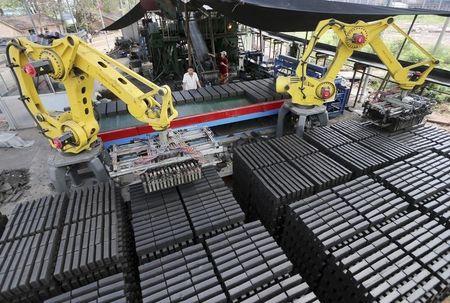BEIJING (Reuters) - Growth in China's manufacturing sector probably steadied in September as factory orders held up, a Reuters poll showed, providing some welcome relief for those who worry the Chinese economy is quickly losing steam.
The official manufacturing Purchasing Managers' Index (PMI)likely edged up slightly to 51.2 in September compared with August's 51.1, leaving it comfortably above the 50-point level demarcating an expansion from a contraction on a monthly basis.
That may assure investors that the world's second-biggest economy, which has stumbled this year, is not doing as badly as some feared. But at the same time, some analysts warned investors against thinking that growth would pick up markedly.
"It is good that it is above 50, but it is not that great," Li Haitao, an economist at Guangdong Development Bank, said in reference to the PMI. "The trend has stayed weak."
Hurt by unsteady exports, a housing downturn and cooling investment growth, the world's second-largest economy has wobbled this year, raising doubts about whether it can grow by around 7.5 percent in 2014 as targeted by Beijing or whether it may be at risk of a sharper slowdown.
That has prompted many investors to bet that Chinese policymakers may further loosen fiscal and monetary policies to stoke growth, following a raft of stimulus measures since spring.
Expectations that China would reduce the amount of deposits that banks must set aside as reserves, or the reserve requirement ratio (RRR), were bolstered earlier this month when data showed growth in factory output unexpectedly fell to a six-year low in August as the housing slowdown increasingly weighs on other parts of the economy.
But on their part, Chinese leaders have said repeatedly that no dramatic change in policy is imminent, partly because China cannot always rely on easy credit conditions to re-vitalise its economy, and partly because policymakers fear that flooding the system with money may feed speculative activities instead of going into the real economy.
Instead, policymakers said they would make "targeted" adjustments by loosening policy reins in the most vulnerable sectors. Some economists have interpreted that to mean that the central bank would prevent short-term interest rates from climbing too much.
The official PMI followed a similar preliminary survey by HSBC/Markit released earlier this week that showed the manufacturing sector gaining momentum in September, even though factory employment slumped to a 5-1/2-year low.
The official PMI is focused on larger factories that belong to the state, as opposed to the HSBC/Markit PMI which is biased towards smaller manufacturers in the private sector.
Smaller firms are facing greater financial stresses and are having trouble getting credit as banks grow more cautious in the face of mounting bad loans and fears of defaults. But a Reuters survey last week found that even many larger firms are relying on heavy state subsidies to keep them in the black.
FORECASTS
Bank of China 51.5
Barclays 51.3
BNP Paribas 50.8
Capital Economics 51.1
China Merchant Securities 51.3
China Minzu Securities 51.4
Citi 50.9
Credit Suisse 50.8
Galaxy Securities 51.2
Guangdong Development Bank 50.8
Guotai Junan Securities 51.3
Huarong Securities 51.1
Hwabao Trust 50.5
ING Financial Markets 51.3
Minsheng Bank 51.3
Natixis 50.8
Nomura 50.6
Shenyin & Wanguo 51.4
TD Securities 50.5
UBS 51.3
Median 51.2
High 51.5
Low 50.5
Prior 51.1

No. of forecasts 20
(Reporting by Jake Spring and Koh Gui Qing; Editing by Kim Coghill)
